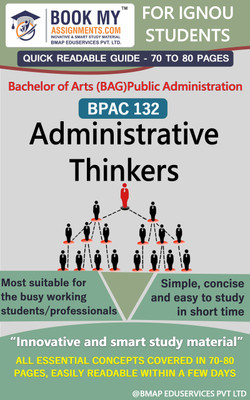IGNOU BPAC 132 Administrative Thinkers Study Guide (Quick Readable Notes) for Ignou Student.(Paperback, BMA Publication)
Quick Overview
Product Price Comparison
IGNOU BPAC 132. Here's a brief overview:Introduction to Administrative Thinkers: Understand the evolution of administrative thought, its significance, and relevance in modern governance.Classical Administrative Thinkers:Max Weber: Bureaucracy, hierarchy, division of labor, and rational-legal authority.Henri Fayol: Principles of management - unity of command, scalar chain, division of work, etc.Frederick Winslow Taylor: Scientific management, efficiency, time-motion studies.Neoclassical Administrative Thinkers:Chester Barnard: The functions of executives, informal organizations, and acceptance theory of authority.Mary Parker Follett: Human relations, integration, and conflict resolution through constructive conflict.Modern Administrative Thinkers:Herbert Simon: Decision-making, bounded rationality, and satisficing.Douglas McGregor: Theory X and Theory Y, contrasting assumptions about human motivation and behavior in organizations.Contemporary Administrative Thinkers:Peter Drucker: Management by objectives (MBO), knowledge worker, and effectiveness.Chris Argyris: Single-loop and double-loop learning, organizational learning, and human behavior in organizations.Comparative Analysis: Compare and contrast the theories and ideas of various administrative thinkers, highlighting their contributions, similarities, and differences.Relevance in Contemporary Context: Discuss the applicability and significance of administrative theories in contemporary organizational settings and public administration.To create your own study guide:Review your course materials, textbooks, lecture notes, and supplementary readings provided by IGNOU.Summarize key concepts, theories, and ideas in your own words.Organize your notes into a structured format for easy reference and quick revision.Use mnemonic devices, charts, diagrams, or bullet points to aid memorization and understanding.Engage in active learning techniques such as self-testing, concept mapping, and explaining concepts to others to reinforce your understanding.Additionally, you can search for open educational resources, academic articles, and online lectures related to administrative thinkers to supplement your study materials. Good luck with your studies!


